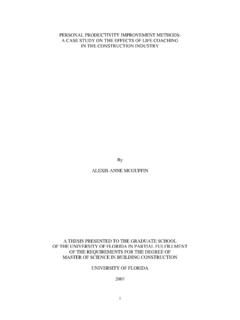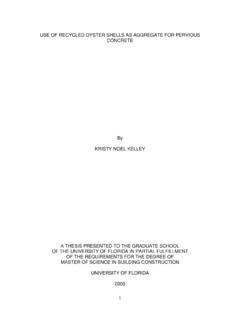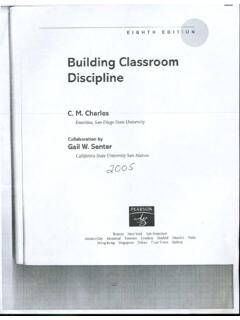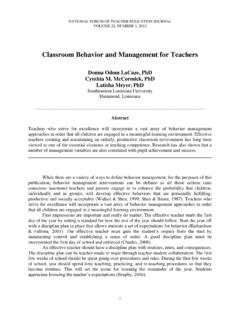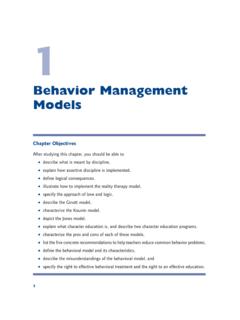Transcription of Effective Discipline Techniques for Parents
1 FCS2289 Effective Discipline Techniques for Parents 1 Cassandra Deas and Eboni J. Baugh 21. This document is FCS2289, one of a series of the Department of Family, Youth and Community Sciences, Florida Cooperative Extension Service, Institute of Food and Agricultural Sciences, University of Florida. Original publication date: November 2008. Visit the EDIS Web site at Cassandra Deas, former undergraduate student, and Eboni J. Baugh, assistant professor, Department of Family, Youth and Community Sciences, Institute of Food and Agricultural Sciences, University of Florida, Gainesville Institute of Food and Agricultural Sciences (IFAS) is an Equal Opportunity Institution authorized to provide research, educational information and other services only to individuals and institutions that function with non-discrimination with respect to race, creed, color, religion, age, disability, sex, sexual orientation, marital status, national origin, political opinions or affiliations.
2 Department of Agriculture, Cooperative Extension Service, University of Florida, IFAS, Florida A. & M. University Cooperative Extension Program, and Boards of County Commissioners Cooperating. Millie Ferrer,Interim DeanDisciplineDiscipline means to "teach and train" and it is not the same as punishment. Punishment focuses on what a child does wrong and does not teach a child what they should do instead; this usually results in misbehavior. As an alternative, Discipline has to do more with teaching your child right and wrong. The most important factor of disciplining your child is how you talk to them. How you talk to your child teaches them how to talk to others as well as respect them. It also teaches him or her which behaviors are acceptable and unacceptable. Every child is diverse and has different temperaments, which could affect disciplining them.
3 Also, Parents must take into consideration developmental levels and age of their children when trying to Discipline them. As a result of all of these factors, parental Discipline will vary from child to child. Parents often realize that Techniques which work for one child may work for another child or in a different situation with the same child. Some Parents may use force, fear, intimidation, and/or punishment with their children. Research has proven that these methods are not Effective and may even harm children. Results show that children become irate, resentful, and dependent upon force. Children may even manipulate Parents when faced with ineffective Discipline . Since children do not always do as their Parents would like, and require Discipline , a parent must be able to choose Effective ways to respond to inappropriate or undesirable purpose of Discipline is to guide and help children develop good judgment and self-regulation.
4 The goal of Discipline is to help the child learn to control his or her impulses and set and follow standards for themselves. Children learn from experience and Parents should provide consequences for misbehavior that help them learn accountability for their actions, without damaging their self-esteem. For instance, if a child does not complete chores, he or she cannot spend the night over to their friend's house for the weekend. If a child is horse-playing at the dinner table and spills their drink, they will have to clean it up. Research shows that Parents who use Effective Discipline raise well-adjusted children who are more self-reliant, self-controlled, and positively curious more so than their peers raised by Parents who are Archival copy: for current recommendations see or your local extension Discipline Techniques for Parents 2punitive, overly strict (authoritarian), or permissive.
5 Effective Parents do not need physical force to Discipline their child, but are more likely to set clear rules, explain why these rules are important, and provide immediate and understandable consequences. Important Reminders about Discipline : Stay CalmAvoid yelling or screaming at your child as this will teach them that it is okay to lose control or have a temper tantrum if they don't get their way. Do not go overboard if your child misbehaves. This simply means, if there is escalation while trying to redirect your child's behavior, take a break until you can regain control of yourself. It is suggested that after an emotional response, it takes at least 20 minutes for the body to return to normal. Send your child to his/her room, or remove yourself from the situation until you calm CriticismTry not to use words that are demeaning or hurtful.
6 For example, do not say things like "You never make good grades" "Write your name better than that" "You're so lazy" Never use name-calling, yelling, mockery, sarcasm, or disrespect. Make sure that your child can differentiate between your feelings about them as a person and the undesired behavior that they displayed. Avoid Too Much PraiseYou do not have to continuously praise your child for routine activities, because it will make your comments less Effective . Encouragement should be used instead of praise, so let your child know when he or she is doing something good by giving them a hug, kiss, or smile. A helpful tip would be to say, "Great Job", "I like it when ", or "Thanks for trying."Don't Focus on the NegativesCreate a system to reinforce positive behavior when it occurs.
7 Let the child know that responses will be rendered in a timely manner, not later. This helps to reinforce the learning of acceptable and unacceptable behaviors. The first step will be to recognize something good the child is doing. For example, try "I like how you clean up your room," instead of, "It's about time you cleaned up that room without me asking you."Avoid Physical PunishmentPhysical punishment includes hitting, tapping, and/or spanking. While hitting children can physically harm them, it also causes them to fear their Parents . In addition physical punishment teaches children that it is okay to hit when they are angry or disappointed. Children may purposely seek attention by acting out, but remember that NO attention is better than negative attention. Spanking is not shown to be more Effective than other forms of Discipline , but research reports that it may encourage aggression, frustration, and anger in the Differences between Rewards and BribesA reward is something your child receives after he or she has done something, in order to encourage repetition of that behavior, while a bribe is given beforehand to try to motivate your child to do what you want.
8 Children who are bribed often learn to manipulate Parents and act in ways to gain more bribes. Try to avoid bribing your child. Be a Good Role ModelChildren will imitate the behavior they observe in the media, from their peers, and especially that of their Parents . Parents must watch their own behavior as it teaches children how to act. Some Parents may have the "Do as I say, not as I do" mentality, which is ineffective and confuses children. Parents must be consistent, firm, and specific in their expectation of their children and the behavior that they display towards their copy: for current recommendations see or your local extension Discipline Techniques for Parents 3 Provide a Child with a Safe EnvironmentA child will grow and develop trust from their Parents if they feel secure and loved.
9 Effective Discipline can help to encourage a child's trust in their Parents . Children need rules and consequences, and often act out as a result of having too few or too many. When given clear behavioral expectations and having those expectations consistently enforced, children feel that they can depend on their Parents to keep them safe from harm. ResourcesPearson, L. J., & Standford, L. A. (2006). The Discipline Miracle: The Clinically Proven System for Raising Happy, Healthy, and Well-Behaved Kids. New York: AMACOM to Say or Do If Your Child: A Parent's Quick Reference for Handling Common Behavior Problems. ReferencesBlock, (2007). Parental Discipline of Young Children. Southern Medical Journal. 100, Issue 5, , , & Lew, Amy (Spring 2000). Talking to Parents about Hitting. Journal of Individual Psychology.
10 56 Issue 1, , Katharine. "How to Discipline Your Child." Retrieved on April 4, 2008, 5 Ways to Talk So Your Children Will Listen." Retrieved on April 4, 2008, "Encouraging Good Behavior." Retrieved on April 6, 2008, " Discipline Guide for Children." Retrieved on April 5, 2008, " Discipline " Retrieved on April 6, 2008, "Reference Article: Study Shows Many Parents Doubt Their Discipline ." Retrieved on April 7, 2008, copy: for current recommendations see or your local extension office.



